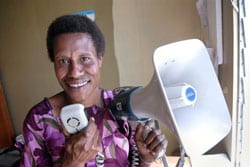The Highlands Region of Papua New Guinea has a new network of women fighting for human rights. Key women leaders from the seven Highlands provinces in Papua New Guinea, all of whom are fighting to defend human rights in their region, joined together in March 2011 to form The Highlands Women’s Human Rights Network (HWHRN). Together, the women are working to promote peace, economic, social and gender justice in the Highlands.
The Highlands Region of Papua New Guinea has a new network of women fighting for human rights.
Key women leaders from the seven Highlands provinces in Papua New Guinea, all of whom are fighting to defend human rights in their region, joined together in March 2011 to form The Highlands Women’s Human Rights Network (HWHRN). Together, the women are working to promote peace, economic, social and gender justice in the Highlands.
The women have also succeeded in winning support from the UN Office of High Commissioner for Human Rights (UN OHCHR)
 |
| The HWHRN is providing brave women from across this remote region with support and resources. |
The women can sometimes feel isolated in this challenging work, so the key aim of the network is provide support to each other. The women in the network will be receiving training from the OHCHR and will have the chance to share their experiences, skills and knowledge with each other, to help them strengthen and expand their work protecting people from human rights abuses.
Oxfam’s role
Oxfam is providing essential administrative and communications support to the network. We’re making monthly phone calls to the women to check on the progress of the network and share information and updates from members of the network and the UN OHCHR.
Oxfam also supports defenders of human rights by helping them get funding through the UN Urgent Action Fund.
Demanding gender justice
It is a huge challenge being a female human rights defender in violent, male-dominated communities.
Tribal conflict has existed for generations, and there is a lot of interpersonal and family violence. Fighting causes huge destruction to homes, gardens, livelihoods, and public assets like schools, as well as forced relocation of many people who are driven off their land.
Human rights defenders, such as the well known Kup Women for Peace (KWP), are determinedly pursuing local solutions to bring peace because they have experienced the first-hand effects of tribal violence.
These courageous women activists have made a stand, mobilised other women, and put pressure on their communities to end violence and defend human rights.
The network’s inspiring women
Monica Paulus has been working hard in Simbu Province to protect women accused of sorcery. Accusations of sorcery are a key cause of conflict amongst communities in the Highlands. Many people in Papua New Guinea do not accept natural causes as an explanation for misfortune, illness, accidents or death. Instead, they attribute them to supernatural causes or sorcery. It is women who are usually accused of using sorcery and deliberately bringing about misfortune. As a result, these women are often brutally attacked and sometimes killed.
The network is trying to tackle this complex problem. Monica pushes for such cases to be heard before the courts to bring perpetrators to justice, and supports women through their ordeal.
Recently, when two women were accused of sorcery, assaulted and received death threats, she was able to call on the Highlands Women’s Human Rights Network for immediate support. Monica successfully relocated one of the women accused of sorcery out of the community to safe ground. One victim managed to escape and survive and her and her young son have been safely relocated. Sadly, her other friend was tortured and beaten to death before help could reached her.
Oxfam sourced funding through the UN Urgent Action Fund. Monica is very appreciative of Oxfam for helping to stop more needless loss of life.
Marilyn Peri is a human rights defender in Tari in the Southern Highlands. She is promoting economic and gender justice through her new organisation, the Hela Rural Women’s Development Foundation. She is mobilising and empowering women to venture into small business to increase their income and build more secure livelihoods for themselves and their families.
Robyn Nenda is a leader in Daulo, Eastern Highlands Province. She is a nurse by profession, but is also working hard to promote gender justice in her area. She stood as an intending candidate for her electorate in the 2007 national elections but wasn’t elected due to the overwhelming cultural norm of male power. However, her local community is encouraging and supporting her to stand again for the upcoming 2012 elections.
Brenda Kapil and Mary Gele in the Western Highlands Province are also working to promote peace and bring to an end ongoing tribal conflicts that are damaging their communities. The women have been looking for approaches and solutions from other communities and so Oxfam has linked them up with Kup Women for Peace (KWP), who are sharing their experiences of bringing an end to 10 years of tribal conflict.
These outstanding women now feel connected, supported and united in a cause to defend human rights, rather than struggling as lone voices in their communities.
The formation of the network has lifted their confidence and motivation to continue working to protect women and to protect human rights in their communities.



